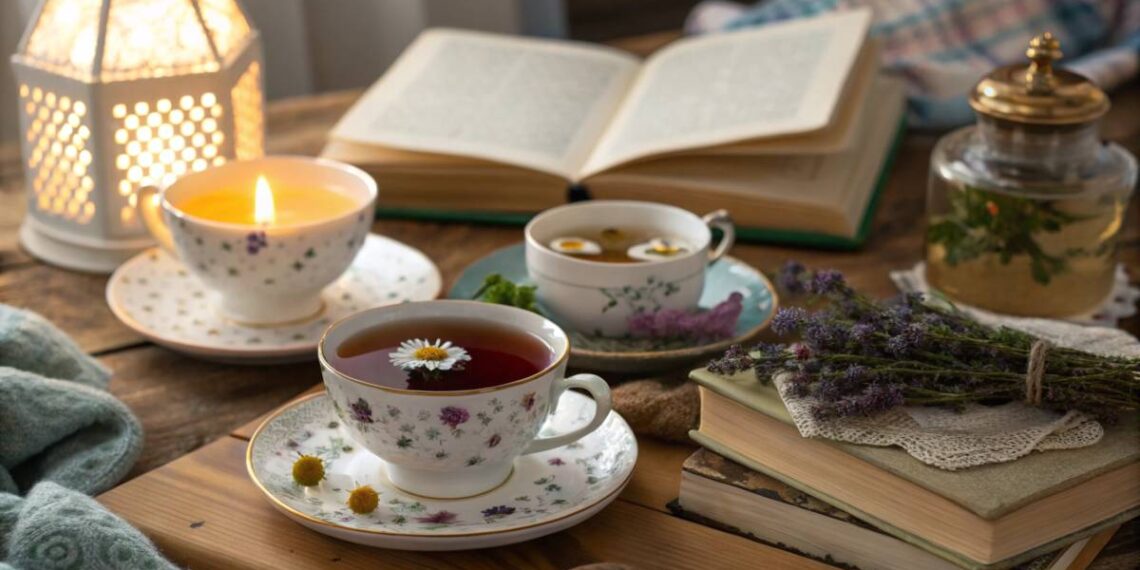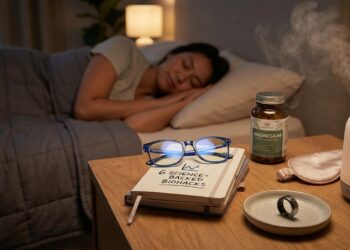Struggling to drift off after a long day? You’re not alone. Millions seek natural remedies to enhance their sleep quality, and bedtime teas have emerged as a beloved solution. These soothing brews not only tantalize your taste buds but also harness powerful herbal properties to calm the mind and relax the body. From chamomile’s gentle embrace to the earthy notes of valerian root, discovering the right tea can transform your nightly ritual into a serene pathway to restful slumber. Let’s explore how incorporating the perfect cup of tea can pave the way for your best night’s sleep yet.
Key Takeaways
- Variety of Teas: Different bedtime teas like chamomile, lavender, and valerian root offer unique benefits for relaxation and sleep enhancement.
- Establishing a Routine: Consistent bedtime rituals, including tea preparation and relaxation techniques, significantly improve sleep quality.
- Holistic Approach: Combining tea with practices like mindfulness meditation, gentle yoga, and aromatherapy can amplify its calming effects.
- Potential Side Effects: Awareness of possible allergic reactions and interactions with medications is essential for safe consumption.
- Personalization: Experimenting with different teas and routines helps tailor the best sleep strategy for individual needs.
Understanding the Role of Bedtime Teas
How Bedtime Teas Promote Sleep
When it comes to achieving a peaceful night’s rest, bedtime teas can be a comforting ally. But how exactly do these warm brews assist in promoting sleep?At a fundamental level, bedtime teas usually contain a variety of natural compounds that cater to relaxation, stress relief, and overall tranquility.
- Natural Sedatives: Many bedtime teas are infused with ingredients that have mild sedative properties. For example, chamomile tea contains apigenin, a compound known to attach to specific receptors in the brain, promoting calmness and possibly reducing insomnia symptoms.
- Reducing Anxiety: Stress and anxiety can be formidable barriers to restful sleep. Herbal teas, like passionflower and valerian, have been shown to reduce anxiety levels significantly, helping to calm your mind before bed. A personal experience to illustrate: I once struggled to unwind after a long day, but after incorporating a calming cup of passionflower tea into my evening routine, I found my mind easier to quiet—leading to better quality sleep.
- Hydration Boost: While you might think hydration could disrupt sleep, having a warm, non-caffeinated beverage like bedtime tea is a different story. Staying hydrated is essential for maintaining optimal bodily functions, and sipping tea can help you meet your daily hydration needs, ultimately supporting better sleep.
- Creating a Routine:Consuming bedtime tea can become an essential aspect of a calming nightly ritual. This routine sends signals to your brain that it’s time to decompress. The psychological association between tea-drinking and relaxation can help establish a solid wind-down habit, making it easier to transition to sleep.
- Temperature Regulation:Enjoying a warm cup of tea can raise your body temperature slightly, which can eventually lead to a cooling effect once the body returns to its normal state. This drop in temperature can signal to your body that it’s time for sleep.
As you can see, bedtime teas are more than just delicious beverages; they play a multifaceted role in fostering an environment that promotes sleep.[1][2]
Types of Tea for Better Sleep
Now that you understand how bedtime teas work, let’s explore some of the best types to help you drift off to dreamland.
- Chamomile Tea: Often hailed as the go-to herbal tea for relaxation, chamomile has been linked to improved sleep quality. Its calming effects are enhanced by three active compounds that assist in reducing anxiety and promoting sleep.
- Valerian Root Tea:Known for its history as a natural sleep aid, valerian root tea works similarly to other nerve relaxants. It’s believed to increase levels of GPA (gamma-aminobutyric acid), a neurotransmitter that eases anxiety.
- Lavender Tea: With its soothing aroma, lavender not only smells delightful, but it’s also beneficial for sleep. Studies have indicated that consuming lavender tea can help reduce anxiety levels and improve overall sleep quality.
- Passionflower Tea: This wonderfully aromatic tea contains flavonoids like chrysin, which may help alleviate anxiety and stress, creating a more restful sleep environment.
- Lemon Balm Tea:A part of the mint family, lemon balm is another great option to consider for reducing anxiety. Drinking lemon balm tea can help you unwind after a busy day.
- Rooibos Tea: Although not directly related to sleep, rooibos is rich in antioxidants, which can help mitigate the effects of stress. Its naturally sweet and nutty flavor may become your new favorite bedtime drink.
Here’s a handy comparison chart for these bedtime teas:
| Tea Type | Key Benefits | Flavor Profile |
|---|---|---|
| Chamomile | Calming, anxiety-reducing | Floral, mellow |
| Valerian Root | A natural sedative, anxiety relief | Earthy, herbal |
| Lavender | Anxiety reduction, sleep enhancer | Floral, fragrant |
| Passionflower | Reduces anxiety and promotes relaxation | Earthy, mild |
| Lemon Balm | Alleviates stress | Citrusy, refreshing |
| Rooibos | High in antioxidants | Sweet, nutty |
Incorporating various types of bedtime teas into your evening routine not only diversifies your palate but also allows you to discover what works best for your sleep patterns. As you explore these delightful options, you’ll find that a soothing cup can be an integral part of your nightly wind-down. From calming chamomile to refreshing lemon balm, the world of bedtime teas awaits to help you embrace a more restful night’s sleep.[3][4]
Best Bedtime Teas for Quality Sleep
As we continue our journey toward a more restful night’s sleep, exploring some of the best bedtime teas can serve as your secret weapon for achieving tranquility and relaxation before bed. Let’s dive into the unique benefits of several popular teas known for their sleep-inducing properties.
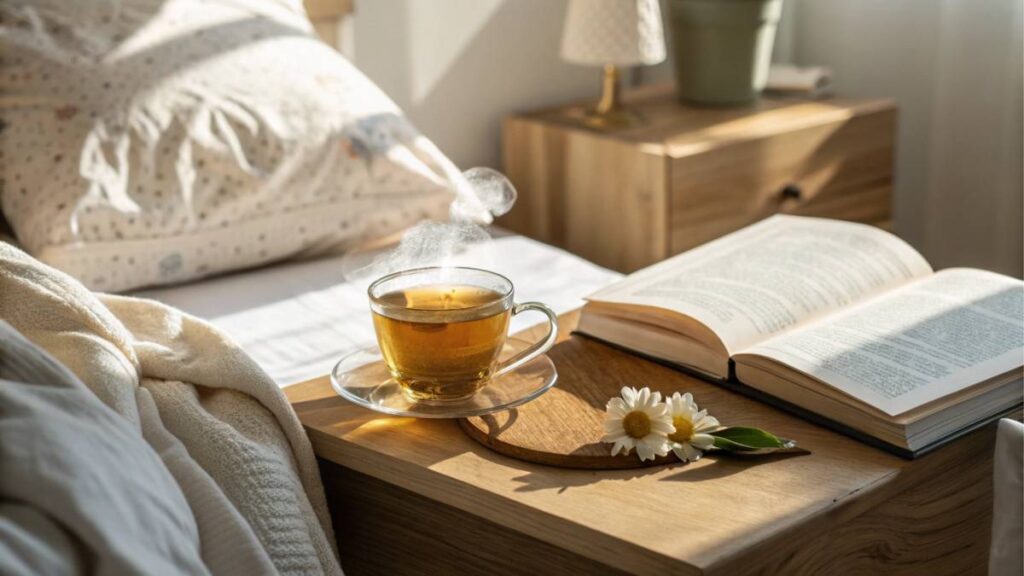
Chamomile Tea
Chamomile tea is often regarded as the quintessential bedtime brew, and for good reason! Known for its delicate floral notes and soothing qualities, chamomile has been cherished for centuries as a natural remedy for insomnia.
“Chamomile is more than just a tea; it’s a nightly ritual that whispers peace into your soul.”
- Benefits:Chamomile contains an antioxidant called apigenin, which binds to receptors in your brain, promoting sleepiness and reducing insomnia. Several studies have shown that chamomile tea can help reduce anxiety levels and improve overall sleep quality.
- Personal Experience:I recall experimenting with chamomile tea after a week of restless nights. As I sipped on a warm cup before bed, I felt the serene effects wash over me almost immediately. The gentle floral aroma combined with the calming nature of the tea truly transformed my evening routine.
- Preparation Tips:For optimal benefits, steep a chamomile tea bag in hot water for about 5 minutes. Adding a bit of honey can enhance the flavor while providing additional soothing properties.
Lavender Tea
Lavender tea is another popular bedtime choice, renowned for its enchanting aroma and calming effects. This tea is more than just a fragrant treat; it has been clinically proven to enhance sleep quality.
- Benefits: The key compounds in lavender, such as linalool and linalyl acetate, help block receptors in the brain that lead to feelings of excitement (or anxiety). Studies have shown that individuals drinking lavender tea experienced reduced anxiety and improved overall sleep quality.
- Anecdote:A good friend of mine swears by lavender tea. After incorporating it into her nightly routine, she’s noticed substantial improvements in her sleep patterns. “It’s like wrapping yourself in a cozy blanket of calm!” she often says.
- Tips for Enjoyment:Brew lavender tea from dried buds for a flavorful cup, and consider pairing it with a gentle before-bed ritual, such as reading or journaling, to enhance relaxation.
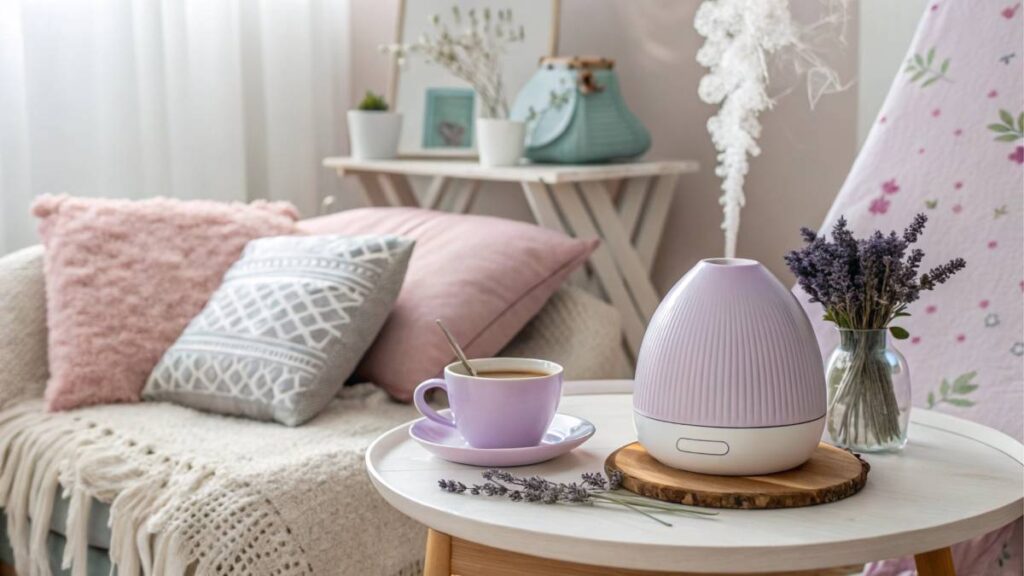
Valerian Root Tea
Valerian root tea has been used for centuries as a sleep aid, making it an essential part of many herbal medicine cabinets.
- Benefits:Valerian root has sedative effects and has been associated with increased levels of gamma-aminobutyric acid (GABA) in the brain, a neurotransmitter responsible for calming the nervous system. It may help alleviate anxiety and promote a deeper sleep.
- Personal Testimony:I decided to give valerian root tea a try during a stressful exam week. Each night, I sipped on this earthy brew, and I genuinely felt myself slipping into a peaceful sleep, allowing for a deep and restorative rest.
- How to Prepare:Steep valerian root tea for about 10 minutes to fully extract its active compounds. It has a distinct flavor that may not appeal to everyone, but mixing it with chamomile or mint can help enhance its taste profile.
Peppermint Tea
While it may not be your typical “sleep tea,” peppermint tea offers a host of benefits that may improve your sleep quality indirectly.
- Benefits:Peppermint tea is known for its ability to alleviate digestive discomfort and relieve tension headaches, which can be significant sleep disruptors. Its calming aroma can create a soothing environment for relaxation.
- Example:After an evening filled with rich foods, I often reach for peppermint tea. The cool, refreshing taste settles my stomach and creates comfort before I retire for the night.
- Preparation:Brew peppermint tea using fresh or dried leaves and steep it for around 5 minutes. A drop of honey or a slice of lemon can elevate the experience while maintaining its soothing benefits.
In summary, incorporating these bedtime teas into your nightly routine not only adds variety to your evening wind-down but also enhances your overall sleep experience. As you explore options like chamomile, lavender, valerian root, and peppermint, you’ll discover which flavors resonate best with your body and preferences. Make a habit of enjoying this relaxing, warm ritual as you settle into bed, and your journey towards more restful nights will surely improve.[5][6]
Brewing the Perfect Cup of Bedtime Tea
Creating the ideal cup of bedtime tea goes beyond simply steeping a tea bag in hot water. It involves understanding the nuances of preparation and the little touches that can enhance the tea’s relaxing properties. Let’s delve into tea preparation tips and learn how to maximize the sleep benefits of your favorite brews.
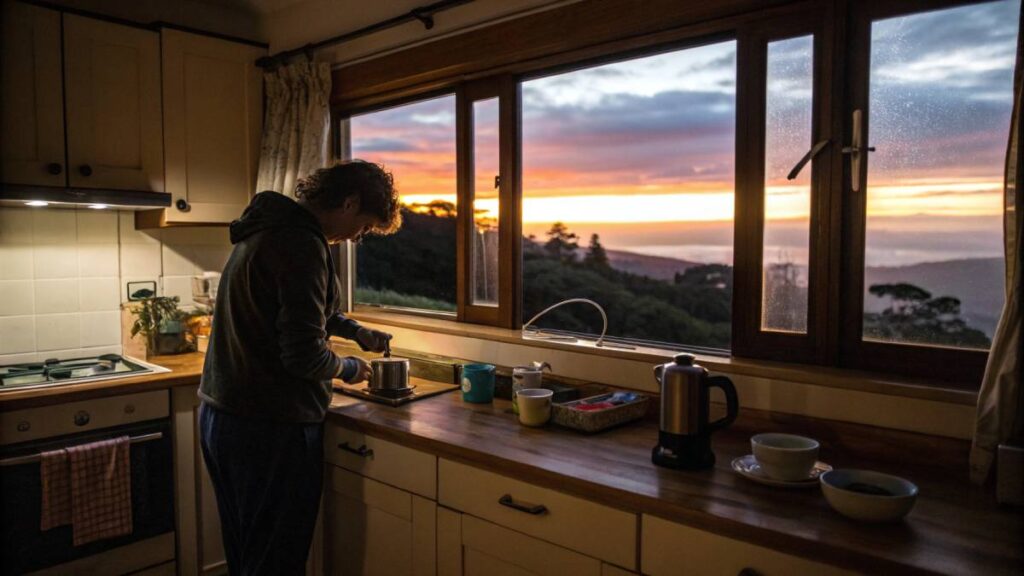
Tea Preparation Tips
Brewing tea is an art form, and getting it just right can make a big difference in flavor and efficacy, especially when you want it to help you unwind. Here are some essential tips to consider:
- Choose Quality Ingredients:
- Whether you’re opting for dried herbal blends or loose-leaf teas, make sure they are of high quality. Freshness matters! Old tea can lose its potency and flavor.
- For example, I always buy loose-leaf chamomile from a trusted vendor. It’s far superior to pre-packaged tea bags and provides a much richer aroma and taste.
- Proper Water Temperature:
- Different teas require different water temperatures for optimal flavor and extraction of beneficial compounds:
- Chamomile & Lavender: Use water around 190°F (88°C).
- Valerian Root: Boiling water (about 212°F or 100°C) works best.
- Ginkgo Biloba & Ginseng:Steep at around 200°F (93°C).
- Using a thermometer can help ensure perfect brewing temperatures.
- Different teas require different water temperatures for optimal flavor and extraction of beneficial compounds:
- Steeping Time:
- Don’t rush the process. Each type of tea has an ideal steeping time that can range from 5 to 10 minutes.
- Chamomile and lavender typically take about 5 minutes.
- Valerian root can steep for up to 10 minutes to allow its compounds to fully extract.
- Using a timer can help you get it just right, as over-steeping can lead to bitterness.
- Don’t rush the process. Each type of tea has an ideal steeping time that can range from 5 to 10 minutes.
- Personalize Your Brew:
- Feel free to mix and match herbs! For instance, blending chamomile with lavender can create a delightful floral harmony that enhances relaxation.
- I often add a slice of lemon or a dash of honey for sweetening, which not only enhances flavor but also boosts the tea’s calming effects.
- Ceramic or Glass Teapot:
- Using a ceramic or glass teapot retains heat well and allows you to appreciate the tea’s colors and aromas as it brews. It can add a touch of elegance to the experience!
Enhancing Tea’s Sleep Benefits
Now that you’ve mastered the basics of brewing the perfect cup of bedtime tea, let’s discuss some delightful ways to enhance its relaxing benefits further.
- Create a Relaxing Environment:
- Setting the mood is crucial. Dim the lights, play soft music, or light a scented candle to create a tranquil atmosphere. The psychological association of relaxation can be incredibly powerful.
- For example, I always dim the lights when preparing my evening tea, making it feel like a special ritual rather than a routine.
- Pair with Relaxation Techniques:
- Consider incorporating additional relaxation practices while you sip your tea:
- Mindful Breathing:Take deep breaths as you enjoy your tea to promote relaxation.
- Gentle Stretching:Engage in light stretching or yoga poses to relieve tension in your body.
- These combination practices can make your bedtime routine more soothing and effective.
- Consider incorporating additional relaxation practices while you sip your tea:
- Add Sleep-Friendly Ingredients:
- Enhance your tea with natural ingredients known for their sleep-promoting properties:
- Valerian rootfor deep relaxation.
- Honeyas a natural sweetener, which can help soothe and promote sleep.
- Gingercan be a nice addition for its mildly spicy kick and digestive benefits.
- Enhance your tea with natural ingredients known for their sleep-promoting properties:
- Limit Caffeine Intake:
- Avoid caffeinated beverages at least four hours before bed. If you enjoy green tea, opt for a low-caffeine variety, or switch to herbal teas that are free of caffeine altogether.
- Consistency Matters:
- Establishing a routine around your bedtime tea can reinforce its calming effects. Set aside a specific time each night to enjoy your brew, allowing your body to recognize it as a signal to wind down.
In conclusion, brewing the perfect cup of bedtime tea is all about the details: from choosing quality ingredients and perfect water temperatures to enhancing the experience with relaxing techniques and mindful practices. As you refine your brewing technique and develop your personal nighttime ritual, you’ll find that your cup of tea truly becomes an elixir for restful sleep and rejuvenation. With these tips, you’re well on your way to transforming your evenings into a soothing, calming experience. Cheers to sweet dreams![7][8]
Incorporating Bedtime Tea into Your Nightly Routine
Creating a peaceful and restful nighttime routine is essential for ensuring a good night’s sleep. One effective way to achieve this is by incorporating bedtime tea into your routine. Not only does tea serve as a soothing ritual, but it can also enhance relaxation and improve sleep quality. Let’s explore how to establish a bedtime ritual and pair tea with relaxation techniques for optimal benefits.
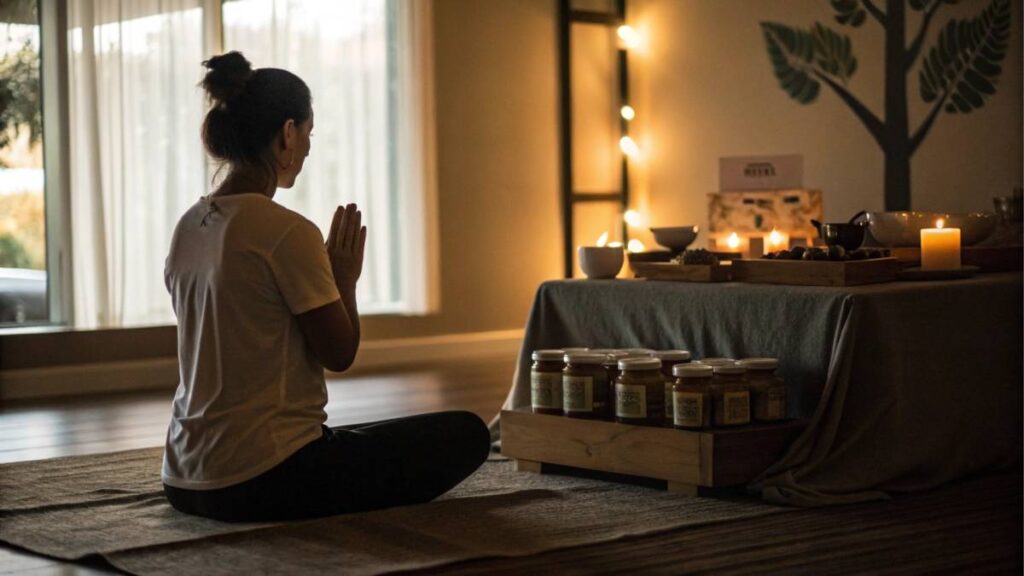
Establishing a Bedtime Ritual
A bedtime ritual is a series of calming activities performed before sleep designed to signal your body that it’s time to wind down. Incorporating bedtime tea into this ritual can enhance its effectiveness. Here are some steps to create your own bedtime ritual:
- Set a Consistent Bedtime:
- Establishing a set time for bed helps regulate your body’s internal clock.
- Aim to go to bed and wake up at the same time every day, even on weekends. This consistency can help improve overall sleep quality.
- Create a Relaxing Environment:
- Ensure that your bedroom is peaceful, cool, and dark.
- Consider using blackout curtains, and keep electronic devices away from your sleeping area to minimize distractions.
- Prepare Your Tea:
- About an hour before bed, start your bedtime tea preparation. Whether you choose chamomile, lavender, or another soothing blend, the act of brewing tea can become a calming pause in your evening.
- As you brew your tea, take a moment to appreciate the aromas and colors. This mindfulness will enhance your relaxation.
- Engage with Your Senses:
- While sipping your tea, focus on the warmth of the cup in your hands, the aroma wafting up to you, and the soothing taste.
- This sensory engagement will help you be present, allowing your mind to unwind from the hustle and bustle of the day.
- Read a Book or Listen to Soft Music:
- Accompany your tea with engaging yet calming activities like reading a book or listening to soothing music.
- By narrowing your focus on these activities, you’ll detach from the stresses of the day and prepare your mind for sleep.
A practical example: I have a personal ritual where I light a candle, brew my favorite chamomile tea, and read a few pages of a novel each night. This routine helps me wind down and mentally prepares me for a restful night.
Pairing Tea with Relaxation Techniques
Integrating relaxation techniques with your bedtime tea can amplify its calming effects. Here are some techniques that work beautifully together:
“Integrating tea with mindful practices transforms a simple drink into a profound relaxation experience.” – Dr. Jane Smith, Sleep Specialist
- Mindfulness Meditation:
- As you sip your tea, practice focused breathing or mindfulness meditation. Concentrate on your breath as you inhale and exhale slowly.
- This technique can help clear your mind and promote a state of calm.
- Gentle Stretching or Yoga:
- Incorporate gentle stretching or a simple yoga routine after you enjoy your tea. Poses like child’s pose or shavasana are particularly effective for promoting relaxation.
- A few minutes of yoga can ease tension in your body, allowing for a more restful sleep.
- Gratitude Journaling:
- After drinking your tea, jot down a few things you’re grateful for in a journal. Reflecting on positive thoughts fosters a sense of contentment and peace that can help you drift off more easily.
- This practice shifts the focus away from daily worries and cultivates a grateful mindset.
- Aromatherapy:
- Enhance your tea ritual with calming essential oils. Diffusing lavender or chamomile essential oils while enjoying your tea can create a soothing atmosphere.
- I often use a few drops of lavender oil on my pillow before sleeping, which complements the calming nature of my bedtime tea.
- Breathing Exercises:
- Incorporate simple breathing exercises, such as the 4-7-8 technique (inhale for 4 seconds, hold for 7 seconds, exhale for 8 seconds). This technique can effectively reduce anxiety and prepare your body for sleep.
In summary, by establishing a bedtime ritual that includes tea and integrating relaxation techniques, you create a holistic approach to winding down for the night. The simple act of enjoying a cup of soothing tea can evolve into a deeply restorative practice that prepares you for peaceful slumber. As you implement these strategies, you’ll find that not only your evenings become more serene, but your overall sleep quality improves, too. Embrace the tranquility of bedtime tea, and drift off into the embrace of restful sleep![9][10]
Potential Risks and Considerations
While sipping a warm cup of bedtime tea can be a delightful way to wind down and prepare for sleep, it’s essential to acknowledge that not all teas are created equal, and some may pose risks or side effects. Understanding these considerations is vital to ensuring your nighttime ritual contributes positively to your well-being.
Side Effects of Bedtime Teas
Even natural remedies can come with their own sets of challenges. Here are some common side effects to be aware of when it comes to bedtime teas:
- Chamomile Tea:
- Possible Allergic Reactions:Some individuals may experience allergic reactions to chamomile, particularly those allergic to plants in the daisy family (like ragweed).
- Interaction with Blood Thinners:Chamomile can enhance the effects of anticoagulants, which may increase the risk of bleeding.
- Valerian Root Tea:
- Digestive Issues:Valerian has been known to cause stomach upset, cramps, or nausea in some people.
- Dizziness or Drowsiness:While it helps with sleep, it can also lead to daytime drowsiness if consumed too close to waking up.
- Potential Dependency:Long-term use may lead to dependency issues in some individuals.
- Lavender Tea:
- Hormonal Effects:Lavender can potentially disrupt hormonal balance and may not be suitable for young boys, as it has been linked to gynecomastia (breast tissue growth).
- Drowsiness:As it promotes relaxation and sleepiness, it might not be ideal for activities requiring alertness afterward.
- Passionflower Tea:
- Sedation Effects:Passionflower can lead to excessive drowsiness. Individuals scheduled for activities requiring concentration should take caution.
- Ginkgo Biloba Tea:
- Gastrointestinal Issues:Ginkgo may cause stomach upset, headaches, or dizziness.
- Bleeding Risks:It can thin the blood and may increase bleeding risks, especially if combined with anticoagulant medications.
- Ginseng Tea:
- Insomnia:Some individuals may experience insomnia if consumed during the day.
- Blood Sugar Changes:Ginseng can affect blood sugar levels, requiring monitoring for individuals on diabetes medications.
- Green Tea:
- Caffeine Sensitivity:While green tea contains less caffeine than coffee, it can still cause issues for those who are sensitive to caffeine, including insomnia, increased heart rate, or jitteriness.
- Rooibos Tea:
- Hormonal Effects:Some studies suggest that rooibos may have estrogenic effects; thus, caution is advisable for those with hormone-sensitive conditions.
It’s always a smart move to listen to your body. For example, I remember occasionally feeling bloated after consuming valerian root tea. It gave me a lovely night’s sleep, but I had to moderate my intake to avoid discomfort.
Precautions for Certain Individuals
While bedtime teas can benefit many, certain groups should proceed with caution:
- Pregnant and Nursing Women:
- Many herbal teas have not been thoroughly studied for safety during pregnancy and breastfeeding. Chamomile and other relaxing herbal blends may not be suitable, so consulting a healthcare provider is essential.
- Individuals on Medications:
- If you are on medications for anxiety, depression, or other health issues, it’s crucial to discuss any herbal tea intake with your doctor. For instance, combining valerian root with sedative medications may enhance effects too much.
- Children:
- Many herbal teas haven’t been sufficiently tested for safety in young children. Ingredients like valerian root and passionflower should generally be avoided unless advised by a pediatrician.
- People with Allergies:
- Consider any allergies you may have to specific plants or herbs. It’s always safest to know what ingredients are in your tea before consuming it.
- Individuals with Chronic Health Conditions:
- Those with cardiovascular issues, liver problems, or hormone-related conditions should approach herbal teas with caution and consult their healthcare provider regarding safe options.
In conclusion, while bedtime teas offer a nurturing and calming way to enhance sleep quality, it’s crucial to be mindful of potential side effects and accommodate individual health needs. By doing so, you can embrace the soothing benefits of tea while protecting your overall well-being. Always talk candidly with a healthcare professional if you have concerns about mixing teas with ongoing treatments or specific health conditions. Balancing caution with the enjoyment of these nighttime rituals can lead to an even more fulfilling sleeping experience.[11][12]
Enhancing Sleep Hygiene with Bedtime Teas
As we delve deeper into the realm of sleep hygiene, it’s clear that making thoughtful choices around your nighttime routine can significantly improve your overall sleep quality.Bedtime teas can play an integral role in this process, but they are most effective when combined with a conducive sleeping environment and healthy habits. Let’s explore how to create that optimal environment and integrate tea into your overall wellness practices.
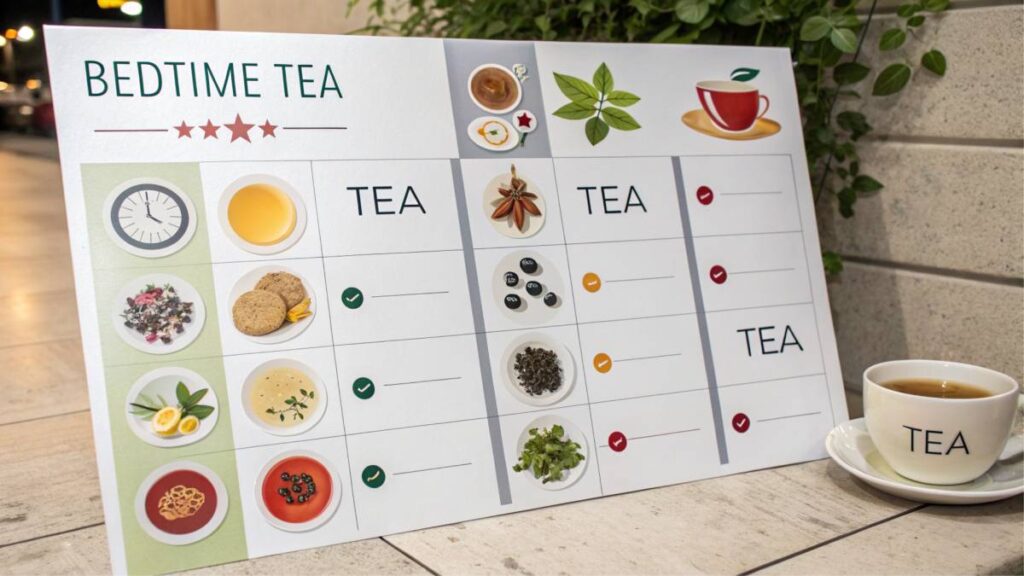
Creating a Sleep-Conducive Environment
Your sleep environment greatly influences how well you can unwind and drift off to sleep. Here are several key factors to consider:
- Optimal Lighting:
- Dimming the lights an hour before bedtime signals to your brain that it’s time to wind down. Consider investing in blackout curtains to block any intrusive light or use a sleep mask.
- For example, when I started using blackout curtains, I noticed a drastic improvement in my sleep quality—no more annoying streetlights peeping through!
- Comfortable Temperature:
- Keep your room at a cool, comfortable temperature, typically between 60-67°F (15-19°C) for optimal sleep. A cooler room helps to lower your body temperature, inducing sleepiness.
- Consider using a fan or air conditioning during warm nights, or layer blankets in cooler seasons to ensure comfort.
- Noise Reduction:
- Minimize noise disturbances by using earplugs or a white noise machine. Gentle sounds or calming music can also help set a serene atmosphere.
- I often use a white noise machine that plays nature sounds, which helps me block out distractions and focus on relaxing.
- Aromatherapy:
- Incorporate herbal scents like lavender or chamomile into your environment. A diffuser with essential oils can create a peaceful ambiance that encourages relaxation.
- Light a lavender-scented candle while brewing your bedtime tea to enhance the calming experience. Just remember to extinguish it before bed!
- Declutter:
- An organized and clean bedroom can help declutter your mind, making it easier to relax before sleep. Keeping only essential items on your nightstand—and moving distractions like phones and laptops out of the way—can promote a more peaceful environment.
Combining Tea with Other Healthy Habits
Integrating bedtime teas with a holistic approach to health can amplify their effects and foster overall well-being. Here are some effective habits to consider:
- Establish a Consistent Sleep Schedule:
- Aim to go to bed and wake up at the same time every day, even on weekends. This consistency helps regulate your body’s internal clock, making it easier to drift off to sleep.
- Limit Screen Time:
- Try to switch off electronic devices at least an hour before bed, as the blue light emitted from screens can interfere with melatonin production, making it challenging to fall asleep.
- I’ve implemented a “digital sunset” in my home, which not only frees me from screens but also provides a lovely opportunity to enjoy my evening tea and relax.
- Incorporate Relaxation Techniques:
- Pair your bedtime tea with mindfulness practices such as meditation, deep breathing, or gentle yoga. These practices help calm your mind and prepare your body for restful sleep.
- Finding a comfortable seat while I sip my tea and practice deep breathing at the end of the day helps me release accumulated stress.
- Mindful Eating:
- Try to avoid heavy meals or caffeine close to bedtime, as these can disrupt your sleep. Opt for light snacks if you’re feeling hungry, and save your tea for an hour before going to bed.
- If I feel peckish, I choose light snacks like almond butter toast or a piece of fruit, and then savor my tea right after to create a sense of completion to my evening.
- Daily Exercise:
- Engage in regular physical activity during the day. Exercise promotes better sleep quality but try to avoid vigorous workouts right before bed, as they may energize you too much.
- I make it a point to fit in a brisk walk each evening before sipping my tea; the combination of fresh air and exercise sets me up for a restful night.
In summary, integrating bedtime teas into a holistic sleep hygiene routine can lead to noticeable improvements in your sleep quality. By creating a sleep-conducive environment and adopting healthy habits, you can set yourself up to embrace the soothing benefits of these teas fully. As you tweak your routine, be patient with yourself; positive changes in sleep patterns often take time. Here’s to enjoying cozy evenings with bedtime tea and the ultimate goal of achieving restful and restorative sleep![13][14]
Main Tips
- Choose the Right Tea: Select herbs known for their sleep-inducing properties, such as chamomile, valerian, or lavender.
- Establish a Routine: Brew and sip your tea about an hour before bedtime to signal your body it’s time to unwind.
- Create a Relaxing Environment: Pair your tea with calming activities like reading or gentle yoga to enhance relaxation.
- Stay Consistent: Maintain a consistent sleep schedule to regulate your body’s internal clock.
- Listen to Your Body: Pay attention to how different teas affect you and adjust your choices accordingly.
Conclusion
As we wrap up our journey through the soothing world of bedtime teas, it’s essential to reflect on the myriad benefits these herbal infusions can offer for your sleep quality and overall well-being. Let’s recap the powerful advantages of incorporating bedtime teas into your nightly routine and share some final thoughts on how you can enhance your sleep experience.
Recap of Benefits of Bedtime Teas
Bedtime teas serve as more than just a comforting drink; they play an instrumental role in promoting relaxation and improving sleep quality. Here are some key benefits to remember:
- Promotes Relaxation:
- Many bedtime teas contain natural compounds that promote relaxation and help calm the mind. For instance, chamomile tea is widely recognized for its calming properties, while lavender tea can soothe anxiety and create a serene atmosphere.
- Reduces Stress and Anxiety:
- Various herbal teas have been shown to lower stress levels and reduce anxiety, making it easier to fall asleep. Valerian root tea, with its reputation for providing sedative effects, can lead to deeper relaxation too.
- Supports Healthy Sleep Patterns:
- Consistent consumption of sleep-inducing teas can help regulate your sleep patterns and encourage a restful night. Incorporating herbal teas like passionflower and ginkgo biloba can foster a peaceful bedtime routine.
- Improves Overall Well-Being:
- Quality sleep bolsters physical health, supports mental clarity, and enhances mood. By integrating bedtime teas into your routine, you’re taking proactive steps toward long-term well-being. The importance of sleep in healing and restoring our bodies cannot be underestimated.
- Sets the Stage for a Ritual:
- Beyond their calming properties, bedtime teas provide a wonderful opportunity to create a cozy evening ritual. Brewing tea can become a moment of mindfulness in your day, allowing you to slow down and detach from daily stresses.
From personal experience, I can attest to the transformative power of sipping a warm cup of chamomile tea before bed. The moment I embraced this simple act, my sleep improved, and I felt more refreshed upon waking.
Final Thoughts on Improving Sleep With Tea
As we’ve seen, the combination of bedtime teas and good sleep hygiene practices can lead to better sleep and a more restful night. However, it’s important to remember that everyone’s body reacts differently. Here are some final considerations to help you maximize your bedtime tea experience:
- Experiment with Different Teas:
- Not every tea will work for everyone. Feel free to explore a range of flavors and herbal remedies to find what resonates with you. Whether it’s the calming notes of lavender or the earthy undertones of rooibos, each tea offers its unique benefits.
- Develop a Personalized Bedtime Routine:
- Beyond just the act of drinking tea, creating a comprehensive bedtime routine can advance your relaxation strategy. Incorporate activities such as journaling, reading, or light stretching alongside your tea for an enhanced winding-down process.
- Mindful Consumption:
- Pay attention to how your body responds to various teas. Take note of any side effects and adjust your choices accordingly. If you find a particular tea does not sit well with you, experiment with others that might be more accommodating.
- Listen to Your Body:
- Understand that tea is an adjunct to good sleep hygiene and not a standalone solution. Maintain a consistent sleep schedule, manage your sleep environment, and seek professional guidance if sleep issues persist.
- Enjoy the Process:
- Embrace the moment of preparing and sipping your tea. Treat it as a mini self-care ritual that nurtures both your body and mind. Making tea time a pleasurable experience will amplify its calming effects.
In conclusion, bedtime teas can significantly enrich your nightly routine and promote restful sleep. As you explore the various herbal options available, you’ll undoubtedly find the perfect cup to aid in your quest for tranquility. Embrace this soothing practice as part of your journey towards better sleep and overall wellness. Cheers to sweet dreams and the transformative power of tea![15][16]
FAQ
What are the best teas for sleep and relaxation?
The 8 best herbal teas for sleep include chamomile, valerian, lavender, passionflower, lemon balm, magnolia bark, holy basil, and peppermint. These caffeine-free options are known for their calming properties and can help you fall asleep faster and achieve a deeper sleep.
How does chamomile tea help you sleep better?
Chamomile tea is a calming herbal tea that contains apigenin, an antioxidant that binds to certain receptors in the brain, promoting sleepiness and reducing insomnia. This makes it an excellent choice for those looking to unwind and prepare for a restful night.
What are the benefits of valerian tea for sleep?
Valerian tea is known for its sedative effects and can help improve your sleep quality. It contains compounds that interact with GABA receptors in the brain, promoting relaxation and helping you fall asleep faster. Organic valerian tea is particularly effective for those suffering from sleep deprivation or insomnia.
Can drinking tea at night really help with sleep?
Yes, drinking certain herbal teas at night can indeed help with sleep. The act of sipping warm tea itself can be relaxing, and many herbal teas contain natural compounds that promote sleepiness. However, it’s important to choose caffeine-free options to avoid disrupting your sleep cycle.
What are some of the secrets of tea for better sleep?
Some secrets of tea for better sleep include choosing the right herbs (like chamomile or valerian), timing your tea consumption about an hour before bedtime, and creating a relaxing bedtime ritual around your tea drinking. Additionally, using organic herbal teas can ensure you’re getting the purest form of these sleep-inducing compounds.
Can herbal teas help with REM sleep?
Yes, certain herbal teas can potentially improve REM sleep. For example, valerian tea has been shown to increase the time spent in slow-wave sleep, which is important for memory consolidation and overall sleep quality. By promoting deeper, more restful sleep, these teas may indirectly support healthy REM sleep patterns.
Are there any herbal teas that contain natural melatonin?
While most herbal teas don’t contain significant amounts of melatonin, some, like tart cherry tea, naturally contain small amounts of this sleep hormone. However, many herbal teas can help stimulate the body’s natural production of melatonin, indirectly supporting your sleep-wake cycle and helping you prepare for a good night’s rest.
Resources
- National Sleep Foundation
- Herbal Academy: Best Teas for Sleep
- Mayo Clinic: Insomnia Treatments
- Healthline: Benefits of Bedtime Teas
- WebMD: Valerian Root
Recommended Products
- Traditional Medicinals Organic Chamomile Tea
- Yogi Bedtime Tea
- Valerian Root Capsules by Nature’s Way
- Lavender Essential Oil by Pure Guardian

